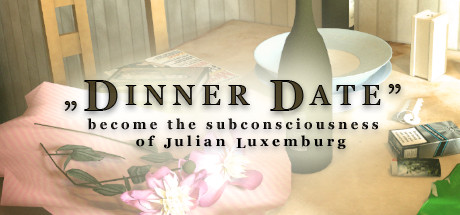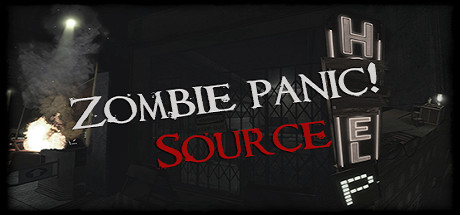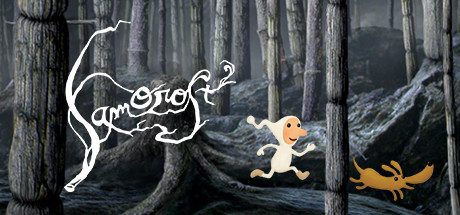Dinner Date Reviews
Julian Luxemburg has prepared a dinner for two at his place – but things go awry when the date does not show up and he is left waiting at his dinner table, the clock’s ticking growing unbearably loud. „Dinner Date” is the character portrait of Julian: by becoming his subconsciousness you gain a clear vantage point on the worries which...
| App ID | 94000 |
| App Type | GAME |
| Developers | Stout Games |
| Publishers | Stout Games |
| Categories | Single-player |
| Genres | Casual, Indie |
| Release Date | 1 Mar, 2011 |
| Platforms | Windows |
| Supported Languages | English, Italian, Russian |

840 Total Reviews
460 Positive Reviews
380 Negative Reviews
Mixed Score
Dinner Date has garnered a total of 840 reviews, with 460 positive reviews and 380 negative reviews, resulting in a ‘Mixed’ overall score.
Reviews Chart
Chart above illustrates the trend of feedback for Dinner Date over time, showcasing the dynamic changes in player opinions as new updates and features have been introduced. This visual representation helps to understand the game's reception and how it has evolved.
Recent Steam Reviews
This section displays the 10 most recent Steam reviews for the game, showcasing a mix of player experiences and sentiments. Each review summary includes the total playtime along with the number of thumbs-up and thumbs-down reactions, clearly indicating the community's feedback
Playtime:
19 minutes
Whining about stuff no one cares about simulator 2011. Worst money I've ever spent. I created a folder in my library specifically for the purpose of hiding truly horrendously terrible games that I am ashamed to even have purchased. This is the only game I've ever put in it.
👍 : 13 |
😃 : 3
Negative
Playtime:
6 minutes
Enter the mind of Julian Luxemburg, a young man whose inability to eat anything but the same piece of somehow rapidly regenerating bread has trapped him in a life of indignity and solitude.
👍 : 89 |
😃 : 10
Negative
Playtime:
20 minutes
Dinner Date is an experimental game, pushing at the edges of what a game can be. You play as Julian Luxemburg, a 27 year old British man who has been set up on a date with a 20 year old Japanese woman named Meiko. As the evening wears on, it becomes clear that Meiko will not be arriving for that date, leaving Julian alone with his thoughts.
This is not a game with gameplay in the traditional sense. While the player can move Julian’s arms through a series of keyboard inputs and decide how much bread Julian eats or how much wine he drinks, none of these progress the gameplay in any way. The only progression through the game is the slow tick of the clock above the table and the meandering of Julian’s thoughts through possibilities, fears, and sorrow.
It’s not a happy game in any way. It’s an experiential game, meant to convey a specific narrative and sensation of being engrossed in that narrative, and a way to experience an event in a safe and empathetic way.
It’s in the assumptions this game makes about the universality of the experiences it depicts that I really struggled and why, perhaps, the game fell flat for me. Rather than empathising with Julian, I felt a softer version of what I felt when I played [url=https://steamcommunity.com/profiles/76561198031223198/recommended/520720/] Dear Esther. [/url] I felt unsafe, unclean, and grateful that Meiko never turned up to this unsettling evening.
In [url=https://www.npr.org/sections/alltechconsidered/2010/10/18/130646920/dinner-date] interviews [/url] he’s given about the game, Dinner Date’s creator, Jeroen Stout, described the game as an opportunity “to sympathize with someone who is slowly consumed by a sense of inadequacy” and a space to explore “things you can’t tell your friends.” This is fundamentally a game built around empathy and around having an unsafe experience in a safe space, and thus gaining a bit of empathy and a taste of the experience for oneself. Whether the game succeeds or fails at its goal is entirely contingent on well it builds the reality of the story and allows the player to inhabit this fundamentally unpleasant place. To be clear, with what little gameplay, graphics, and general interactivity Dinner Date has, it does a good job of drawing the player into the narrative. Throughout the game’s brief runtime, there is a decided sense of claustrophobia and anxiety as it becomes clear how much the player is trapped in this evening gone wrong. The glasses of wine and cigarettes only highlight the cycle of bad decisions that led to this point, and which will probably lead to more like it.
As well as the game does with crafting a setting, though, what it didn’t succeed in doing was making me feel sympathy for Julian. Julian’s monologue about his life has the dual function of both creating a sense of anxiety and self-loathing, and telling a story - however brief - of who he is and how he got here. He talks about how he got to this point, his fears and doubts, and what he wanted with the evening.
In doing so, this stopped being a game I could see myself in. Instead, I saw the mind of every man who has harassed me in the street, the ones who would not stop pestering me for my number, the ones who followed me home and made me feel unsafe. In listening to Julian’s monologue, I saw a bit more of the truths of the men who believed themselves to be entitled to my company, and I did not sympathise with them.
That Stout hopes Dinner Date captures some degree of universality and expects empathy worries me.
It’s hard to put my finger on what exactly makes me uncomfortable about Julian Luxembourg. It may be that he is 27, waiting for a 20 year old woman to come into his apartment so he can have sex with her. It may be how he softly rages when she doesn’t appear, mentally accusing her of sleeping around. It may be the way he repeats that he “deserves” this over the course of the evening, though whether that “this” is the date or the sex is unclear. It may be the way he continues to sit at the table for hours, staring at the door after it’s long become apparent she’s not coming. It may be that he doesn’t call her and instead prefers to linger in the fantasies of what-ifs rather than engaging with her as a person. It’s this long medley of thoughts and actions that sent my hackles up and made me feel uncomfortable to be in this man’s skin. If there is a universality to his thoughts about being stood up, it’s not one I identify with. It’s entirely possible that universality is a male one, but even then, I would hate to believe that the universal male experience is to mentally slut shame a significantly younger woman for not coming to a late evening at an older man’s apartment.
If the idea of the game is to make me feel empathy as a man spirals into self-loathing, it fails. I see the self-loathing, but the way it manifests is toxic. Self-loathing has a tendency towards toxicity, sure, but that toxicity isn’t inherently misogynistic. There are ways to tell this story that make it actually universal and actually generate some degree of empathy. The story told here is an explanation rather than an event.
I think, too, this game hits a bit differently, given that I played it the day before getting stood up on a date of my own. It’s in the comparison of my experience and thoughts and Julian’s that the ideas and goals of this game ring truly hollow.
My potential date was meant to meet me for coffee. It was supposed to be the first date I’d been on in years. I went across the city to meet her, fiddling with my nails, my hair, my clothes, my phone on the metro the whole way. She e-mailed me as I was arriving at the coffee shop, telling me she wasn’t going to be able to make it, and I was left there, standing outside the coffee shop, unsure of what to do with my now empty afternoon.
I got a cup of tea, sat down, and finished the book I’d been trying and failing to read on the metro.
As I sat and read and drank my tea, I thought through the things that had brought me to that point. I thought about my nervousness about the date, and about the woman I was planning to meet. My mind ran back through all the things I’d planned to talk about, all the jokes I’d tell, and all the things I’d imagined she’d say that I would laugh at and sympathise with in turn. I played through the scenarios I’d imagined, then set them all aside. I did not know why she’d cancelled on me. I wasn’t going to ask because her business was her own. All that mattered was that there was no date, and it was up to me to decide how to move on from that. I could linger, and in so doing, accomplish nothing but misery for everyone, or I could go on with my life, and she hers.
I drank my tea. I went home. I moved on.
This story of my own date is not necessarily a better version of the story Stout chose to tell. However, that it’s a different story speaks volumes about the story he is telling, and about the ideas he believes are inherent. I recognise that my experience as a woman may colour my views on dating and male toxicity. That this is a game meant for men and the male dating experience, and I will therefore never actually be able to find myself in it is an entirely valid possibility. If that is the case, it works, and I humbly accept that, as a non-male, I do not have a clear window on the male experience.
However, if this is a game offering universality and a generally understandable portrait of empathy, it’s worth considering why it doesn’t work from my female perspective. In being locked in Julian’s narrative, I think of my own narrative and though processes. I compare our paths, and to compensate for my own failings, I critique his. I find him wanting, perhaps as a solace to myself, and perhaps as a subjective truth, but I find his is not a head I feel safe in.
We can be sad. We can feel pain. It doesn’t have to be at the expense of others.
👍 : 10 |
😃 : 0
Negative
Playtime:
22 minutes
Avoid at all costs.
I can appreciate art games when done right, Dear Esther was a fantastic aural and visual presentation, and Gone Home told a heartbreaking story that could only be experienced through a videogame. Dinner Date tho, is one of the worst 5 dollars i have spent.
Its a shame, because the concept is interesting, and to be honest i like the idea of it, putting the player in the mind of a character and being able to see his thoughts is intriguing. The problem is, there is little value or reason to be paying 5 bucks for this. Its over in about 15 minutes. 15 MINUTES. When games like Heavy Rain do these types of games, they give a good long narrative. Or even a telltale episode, you get 2 hours of story content for 5 dollars. Here, you stay in a room, and pick thoughts. Then it ends.
This could have been an interesting demo for free, that could be an interesting mechanic in story based games. I cannot recommend it at all for its price point, you would be better off watching the walkthrough on youtube.
👍 : 30 |
😃 : 1
Negative
Playtime:
24 minutes
Lately, I've been making a habit of trying out games with "Mixed" reviews--often, I find them to be the most interesting. Dinner Date is a game that isn't for everyone; some might not enjoy the concept, others might find it boring. This isn't a game in which the goal is clear, and the end result isn't necessarily what you would call gratifying. There are no bosses to defeat or world to save. To me, this game embodies "virtual reality" in a much more emotional sense.
You are the subconscious of the protagonist, Julian, as he experiences the agony of waiting on his "dinner date" to arrive. This means, you really have no control over what is happening. You can merely observe and react in the most subtle of ways. As the story unfolds before you, you are given a set of choices. Will Julian glance nervously at the clock, have a cigarette to calm his nerves or have another glass of wine as he bemoans his situation? The voiceover acting is very well done, and adds to realism of the game. If you've ever experienced the anxiety of anticipation. and the agony of disappointment, the game expresses both perfectly.
In order to truly enjoy this game, you have to accept the fact that nothing you do will change its outcome. You are merely along for the ride, guiding Julian's thoughts and actions along the way via a growing number of options by pressing specific buttons on your keyboard, which lead to certain interactions. But it's not as if you're sitting there idle while a long cinematic cutscene plays either; it's an experience you can be a part of from start to finish. As Julian's subconscious, you are like the director with Julian as the actor. Considering the options are numerous, and you can choose them in any order you wish, everybody's experience in the game will be slightly different and unique to them, even if the ending is the same. It gives it a very personal feel which I enjoyed. Overall, this is an overlooked and misunderstood little gem of a game.
👍 : 19 |
😃 : 2
Positive
Playtime:
18 minutes
This was a very interesting, but short experience.
In this game you play as the subconsciousness of Julian Luxemburg.
There are only a few options, and there is not much more you can do than just listen to his thoughts.
The decisions you do make, won't have any effect on the game.
Julian is patiently waiting for his date with a Japanese girl called Meiko to arrive.
The later it's getting, The more desperate Julian starts to sound.
There are, what seems like endless thoughts running through his mind.
Rather than just calling or texting Meiko, Julian rather talks to himself apparently.
He eats some bread with tapenade, soup and drinks some wine.
Thinking about how he really wanted to have sex with the 20 year old Meiko.
He sounds really pathetic, and I had no idea guys could over think this much.
Now I won't spoiler the game for you, But if I was Meiko, I wouldn't come!
It's extremely boring, and this game is not worth €3,99.
👍 : 16 |
😃 : 0
Negative
Playtime:
62 minutes
This game is the biggest pile of pretentious tripe I've ever played, this is coming from someone who's favourite experience from a video game was Dear Esther.
Say what you like about Dear Esther but the point of it was that it was following the inner thoughts of a suicidally depressed man as we got some insight on loss, pain, depression and regret and what does Dinner Date offer us? The Inner thoughts of a boring, pretentious pillock, who's whining because nobody wants to bugger him.
I'm serious, this whole game is just a man, sat at a table, whining because he can't get laid and the worst part is that he has no redeeming qualities. He's racist, narcissistic, boring and full of crap. There is NOTHING worth investing yourself in, it's not even funny boring, it's just boring.
You could honestly get the same experience by going to your kitchen table and sitting there for twenty or so minutes, like you're waiting for a date, listening to a pod cast on the colour baige the entire time. There, you've played Dinner Date, except you can actually eat the food and turn off the podcast.
So, why haven't I spoken about the gameplay? Because there is none! Again, Dear Esther, you can walk around and look at stuff, listen to the monologue or enjoy the scenery. Here, there's NOTHING! You can interact with things, sure but only when the game tells you that it's okay to, otherwise you just hover your hand over it, like you're thinking about doing it. The game even tells you that you aren't in control and you're the character's subconscious, making this no more of a game than one of those College Humour POV videos, except those are funny and often relatable, whereas this is just garbage.
You have dozens of options presented to you, whilst you listen to the insightful inner thoughts of the loathesome protagonist and all that I was able to do was dip bread into a sauce and eat it. Although, I will say that I did find one thing in common with this guy, we were both incredibly bored and clock watching, throughout the experience.
The visuals look like shit, I'm by no means a graphics snob but if you're going to force us to look at something for half an hour at least make it look realistic/nice or at least give it its own style like Facade. But no, this looks like a PS2 game that has gone through a dishwasher, it looks really shoddy.
The final thing I have to say is that everything about this game is still pretentious, despite the fact that it offers NOTHING, it acts like it's high art. It constantly has the div recite poetry with classical music playing in the background, whilst he goes on about how Japanese girls can't hold their liquor and how he can't wait for his date to show up so he can shag her. Bugger off Dinner Date, just bugger off.
During the hit list- I mean... credits, my eyes were drawn to the list of the cast and crew and bugger me backwards...
Try thinking up the most pretentious pseudonym you can, make it sound french and artsy like: Don Panthane Do Blur or some shit like that. Because the credits is full of those names, it's so full of it.
Don't buy this. If I had a physical copy of this game, I would've taken it out back and pissed on it. Screw this game!
👍 : 25 |
😃 : 5
Negative
Playtime:
43 minutes
A 22 minute game about an English man feeling sorry for himself, getting drunk, and feeling more sorry for himself. Game will essentially play itself if you don't touch it.
While it's a relatively early indie game and the tools weren't quite there yet at the time, there's just not anything to it, be it gameplay or story, unless you really want to get in the mind of a 27 year old white guy upset that he didn't get to have sex with a 20 year old Japanese girl.
👍 : 13 |
😃 : 2
Negative
Playtime:
23 minutes
This game is good if your life sucks like mine
I mean it's the same price than a chocolate bar or a beer, but you can cry to this game longer
👍 : 104 |
😃 : 105
Positive
Playtime:
40 minutes
Dinner Date is a very short indie title about a man waiting for his date to arrive and I fucking hated it.
The main reason I hated this game was mainly due to the usual false expectations scenario. Rather than just completely rip this game apart let me explain what I thought the game was going to be, and then what the game actually is.
What I thought Dinner Date was going to be:
Everything I thought this game was going to be came from what people posted about on the internet. Nothing I am writing in this section is what I hoped the game would be, this is what I expected based on others experiences with it. Like I mentioned above, this is a game about a man waiting for his date to arrive at his house. However, I was under the assumption that this would be 1st person, without any narration, and you are completely free to do whatever you want while you wait for the date. You do not know who the date is, or why this man is possibly being stood up. Maybe this is him being dumped, maybe he murdered her, maybe he doesn’t have a date and he’s lonely, we just don’t know. While waiting for your possible date to arrive, you are free to do whatever you want in your apartment. Doing actions will affect the outcome of “The Date”. Maybe you could eat your entire meal before he/she shows up, would that have an effect? Maybe if you drink the whole bottle of wine you will pass out and miss the date entirely, never knowing if the person came by or not. Maybe you could just sit there and wait the entire time, twiddling your thumbs, eagerly watching the clock. Maybe you could just fucking kill yourself, the point is what sold me on this game was mystery. Every time I looked into this game online, for whatever reason, the game was completely shrouded in mystery, and this made me want to play the game so badly. I was honestly expecting to play this game multiple times just to see what else I could make happen. There could’ve been so many possibilities, so many outcomes, but as you can guess I ended up being tremendously disappointed.
What Dinner Date actually is:
A monologue. The game is literally just a monologue disguised as a video game. If there are any David Cage fanboys reading this, buy this game right now. NOTHING you do while you “wait” for you date matters. I only played this game once and I went in with the intention of killing my character through alcohol abuse, but even though I am drinking down a glass of wine every 5 seconds, the character doesn’t shut up…even while he is drinking. You are forced to listen to this guy whine and complain and there’s nothing you can do about it. Yeah, there are actions, but they are fucking meaningless. I’m pretty sure if someone smoked 47 cigarettes in a row he would maybe cough a few times in the middle of his bitching. The game kept giving me hope that something good would happen. Oh look! He’s getting up! Can I jump out the window? Nope. Can I open my fridge? Nope. Well, can I grab that endless bottle of wine again? Not right now, nope. When I realized that I could just sit back and the game would play itself I decided to stick through to the end, with the hope that maybe something interesting would happen, but of course not. You listen to this guy whine and complain about life for awhile and then that’s it, it just ends. He doesn’t kill himself (sadly), the date never shows up, nothing fucking happens. The best part about the uh experience is the torture is short. My game time for this is 23 minutes and I waiting till the credits ended.
So that’s it, I can’t even recommend this game to people who enjoy monologues, or hearing sad..ish life stories. Rather that waste your time listening to this guys issue’s you could go hang out with your friends, and maybe help them with their problems. I can promise in that situation different outcomes and functionality that makes an impact, I dare you to try and drink as much wine as I did in this game while hearing your friend talk. In other words, real life is more of a video game than Dinner Date.
👍 : 253 |
😃 : 12
Negative







